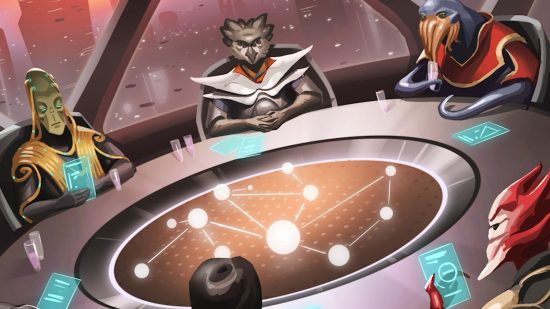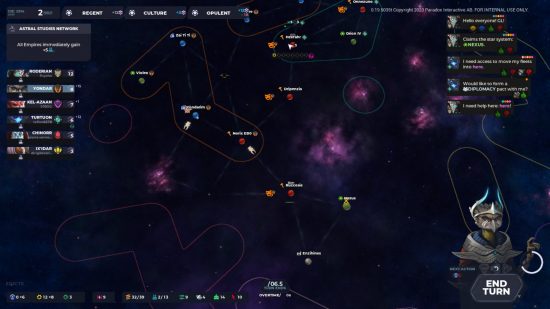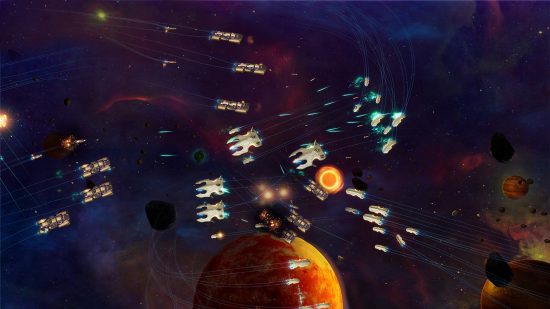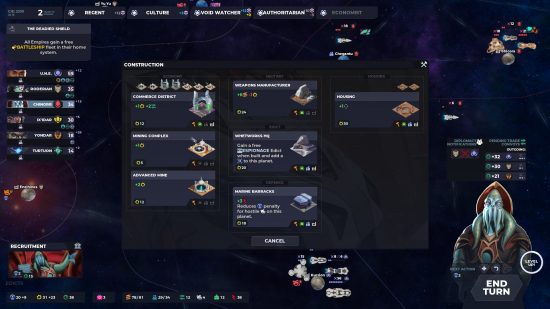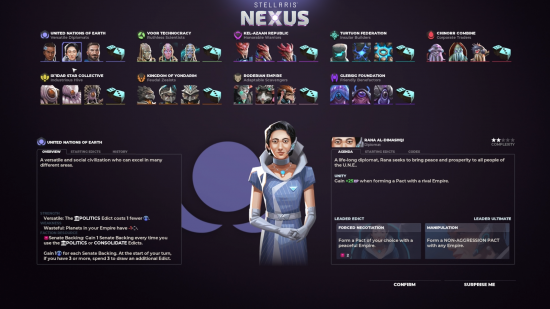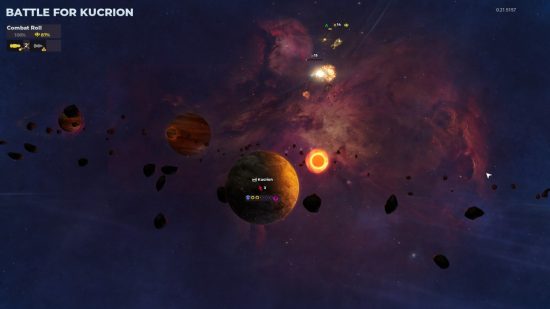We were intrigued by Stellaris Nexus after our time playing a preview of the game, in which we lead the Yondar birdfolk towards cultural and military dominance.
Enjoying the game’s fast pace and board game-like feel (read our Stellaris Nexus preview to hear our thoughts) we were intrigued to find out more. And as Stellaris Nexus hit early access on December 12, it seems fans have enjoyed it as much as we did. So we sat down with Whatboy’s co-founders to really dig deep into the ideas and innovations behind the game.
We spoke to game director Adam Doherty (head of all things design and code-y) and studio director Dax (head of marketing, PR, and everything not code-y) about inspirations for Stellaris Nexus, how the game was designed, and how it stands apart from its Paradox big brother.

Wargamer: So first things first, where did the idea for Stellaris Nexus come from?
Adam Doherty: The idea really comes from a mixture of my love of 4x games and tabletop games. And always wanting to play a game like Civilization or Stellaris multiplayer but never had the right group of friends that can make that kind of long term commitment to playing a multi hour 4X game. So on the other hand I love that much shorter experience, you get with something like a board game or a tabletop game, where you can get through a session very quickly, it’s all very social.
So it was really kind of: can we kind of bring those two worlds together and make something that condenses a lot of the decisions you make in a 4X game into fewer more impactful terms. But with that comes the opportunity to make it suitable for multiplayer sessions and have that social experience where you sit down with a group of friends or a group of strangers find us and play through a very interactive 4x experience in about an hour or so.
Wargamer: It’s interesting you brought in tabletop games there, as something that really came across to me is how much Stellaris Nexus feels like playing a board game. I’ve seen a lot of comparisons online to Twilight Imperium, and I wondered if that was a source of inspiration for you?
Adam Doherty: It’s certainly an inspiration. I mean, I’ve played the game about twice. It’s the kind of game that I’d love to play more but it takes a whole day.
Certainly that was a point of inspiration as it does have that great experience of five, six of you sitting around a table planning, backstabbing, politicking, which is really kind of one of the main points of Stellaris Nexus – was to bring that idea of quick, really sort of ruthless backstabby, lots of temporary alliances, all within a short timeframe.
So hopefully, that’ll mean, you know, you can’t hold too many grudges. Things like people playing six months long games of Diplomacy, and it ruining friendships after five months of thinking they were allies. I think that kind of more bite-sized experience is a bit easier to shrug off.
Wargamer: It does seem that as much as it’s a quick way to get the Stellaris experience, it’s a quick way to get the experience of a big strategy board game like that.
Dax Ginn: And even just the social component. Anyone who has played a board game, or, or is a fan of tabletop games, the thing that they all have in common is that they’re deeply social. And so we’re really leaning into that idea of social interaction in a strategy game.
When we first started the development process for Stellaris Nexus, my job on the sort of marketing side is: what other games are doing similar things? What do we benchmark against? And there was sort of, Among Us, which is a very social experience, but not a strategy experience.
And so it sort of felt like putting these two things together – the social appeal that you get from a tabletop experience with a turn based strategy game – there’s really no one else out there doing that. And so that’s what the immediate appeal for us was. Can we do something that’s not been done before in the computer game space, borrowing all of these ideas and inspirations from the tabletop space?
Wargamer: One thing I wanted to ask you is that obviously your intention with Stellaris Nexus is for a game to be playable in an hour. Partly because I was new to it, I found playing at that speed on multiplayer to be quite frantic. Is the idea for it to be quite a quick-fire, almost chaotic experience?
Adam: I mean, the intention really is to not necessarily be chaotic, but just to keep it moving forward. And your first few games will be like that, particularly if you’re playing with a time limit.
We allow you to play custom, with some friends. I would suggest you probably start with a long time limit, no time limit, or try out single player first. But as you get to know the game, you find that you spend a lot less time doing your actions and much more time planning.
So once you get that mastery, it becomes a lot less frantic. Normally you can only sort of take three or four actions in a turn so you have plenty of time to actually do it. It’s more just about thinking what you’re going to do, which comes a lot more natural, once you learn the systems, and the technologies and stuff like that.

Dax: There’s also a lot to be said for really being aware of the faction and the leader that you’ve chosen. Because they all have their own unique agendas, which is a strength within those factions that you can play to.
So when you’re playing as the Voor Technocracy for example, you know that they’re all about scientific research. And so exploring and researching new technologies is their strength. So if you are feeling under pressure, and you’ve got to make a decision between researching a technology or building a fleet, you know that because you’re playing as the Voor, the smart move is playing to the strength of that faction: so go for research.
And so really thinking about how do I roleplay as this faction, as this leader, and how do I allow myself to be guided by what I know their strengths are? That can take a lot of the guesswork out of it. Because it then becomes instinctive that you’re going to pursue research and technology, the more you’re going to pursue warfare as the Kel-Azaan, you’re going to pursue diplomacy as the United Nations of Earth, you’re going to pursue profit making as the Chinorr.
Wargamer: It’s something that came to me, because after that first frantic multiplayer experience, playing singleplayer without a time limit was very different – I was taking my time, looking more closely at the numbers. Would you say that there’s more than one way to play this game and be successful?
Adam: Definitely. I mean, a lot of it is about playing the table as much as the micro management. Like just sort of staying out of things, convincing everyone you’re not the threat, a lot of those soft skills really come into play when you’re playing over voice com against people you know.
But as you said, there’s lots of different ways to play. You can try out all sorts of different strategies, and for something like Civ that will take you like five or six hours each run. With Stellaris Nexus you think “I wonder if this strategy will work? I wonder if this strategy will work?” And you can just try it out in the single player experience just for an hour or so.
Dax: Also being able to undo any action is really helpful so within a turn you can make all your decisions, and then you can undo them all and then try something else before you commit to all of those things resolving simultaneously.
Wargamer: Who would you say is the target audience for Stellaris Nexus?
Dax: Well, I think there’s a lot of audiences who will find something in Stellaris Nexus to get really excited about or to find compelling. So strategy gamers, particularly turn based strategy gamers, as you know, that is the heart and soul of the game.
4X players who love that idea of starting small and ending big, and I think that’s something all gamers find a really compelling idea, of beginning in a corner of the galaxy with the potential of dominating the entire galaxy. And being able to do that within about a 60 minute period of time. It’s just that idea is really exciting.
For me, personally, the exploration X of 4X, of exploring the unknown, as you expand is super duper exciting as well. And something that I really love about the game.
But I think also MOBA fans – a game of League of Legends or Heroes of the Storm or something – the idea is that it is playable, start to finish, in a pretty compact timeframe. So, I think maybe lapsed RTS gamers or people who are looking to make better use of their gaming time.
As the years have gone on, we’ve all got less and less spare time. So the idea of signing up to play 200 hours of a game… I mean, obviously games like that still exist. And there’s a big audience for that sort of massive, epic time commitment. But I think what Adam and I were talking about right at the beginning of this is, there’s also going to be an audience of people who want a game that fits in the holes, that fits in the gaps of these other big, epic adventures.
And so making a game that is that deep and strategic, and requires a lot of focus, but is over quickly so that you can either play again, or come back to it when your friends are available. And be thinking in between those game sessions “what could I have done differently, or how will I approach it next time?”
I think that’s one of the real kind of sticky aspects of Stellaris Nexus: that it does get stuck in your head. And if you win, that’s great. But there’s only one winner. And so there’s many, many more losers. And you don’t come away from it thinking “Man I wish I’d never played” you come away thinking, “I can’t wait to play again, so I can not make those mistakes that I did last time.”
Adam: The discussions we have post-game usually go on for as long as the games themselves.
My immediate answer to the ‘target audience’ question is we make games that we want to play. What’s the kind of experience that doesn’t really exist that we have the right team and right resources for. And we have lots of different kinds of players on our team as well who love the game for different reasons. Some players are very competitive, some players are not and just like it for the social experience and doing their own thing. Some who just want to roleplay as a slimy grub.
Dax: But I think, Matt, the point that you made before about the singleplayer versus the multiplayer experience, the multiplayer experience is time boxed. So there’s a real momentum to it, a real inertia to it. When you play single player, it can be very zen-like. You can play very slowly and really think about everything. And so there is a sort of a soothing strategy feel to that, that’s really different to the multiplayer experience.
Wargamer: I was impressed with the variety of the factions and also the asymmetry. It made me wonder. how do you go about balancing a game like this? And what’s your philosophy towards balance in general, is it more boardgame-like or more like a typical Paradox game?
Adam: In terms of balance we want to keep the game as competitive as possible, but also as varied as possible. One of the key things about balance is not just making sure all the factions are equal but also making sure all the different paths to victory are strong.
So we have some factions that are very strong in culture or economy or diplomacy, and some that are much more focused on science or military. We collect data for games and take feedback from our own group and our test groups. So a lot of work goes into making sure that if you want to go to war there’s a route to victory; if you don’t want to, if you want to be nice, make friends, there’s a faction just for you.
Wargamer: Digging quite deep into game mechanics for a second. The combat in Stellaris Nexus interests me because it’s not really tied to the edict system that dictates so much else in the game. It kind of means if you’re in a war you’re picking between doing your edicts or doing the war. Is that an intentional risk-reward system you put in?
Adam: Yeah it was always intentional. The military options are always there, so you’ve got to make a choice between how much of your focus, how much of your support you spend towards your military goals, whether that is sort of early expansion, or whether it’s when you’re in a war with someone, you have always got this sort of push and pull between how much focus do I put on taking this planet for expanding, to how much do I spend on using edicts to either buff my economy or to trade or interact with other planets? That was always a key part of the design from day one.
I mean, a lot of the systems have changed, the action point system and stuff has changed and morphed over that development. But it has always always been that kind of push and pull between how much do I focus on military expansion and how much do I focus on economy and interacting with other players?
Wargamer: How much change do you see coming to Stellaris Nexus through early access? How close are you now to the finished product now and how much more is there to come?
Adam: In terms of stuff we know about we are looking at adding more factions, more leaders. We have the start of our story mode, which tells the story up to the start of the succession mode, and also will introduce you in a more sedate way to all the factions. So that you learn the mechanics and some cool things about them before you jump into multiplayer.
We plan to add a ranked mode for players who want to get really competitive. But beyond that, what we really want to do is get the game out there in players’ hands and see what players want, how players like to play because, as Dax said earlier, there’s not a lot of games like this out there at the moment.
So we want to see whether players’ gravitate towards match making, custom games with friends, custom games through discord that are arranged online. So we really want to engage the community to find out the ways that they want to play and really push the game in the direction that players want us to.
Wargamer: One slight concern I had is I wondered if people are looking at the game, seeing the Stellaris Nexus title and go in expecting it to play similarly to Stellaris – they might be a bit disappointed by the more compact, board-game feel of it?
Adam: I think we very much see ourselves as a game in that universe. Not a cut down Stellaris. We’re not trying to make Stellaris Lite. We’re making a different game in that universe. It’s similar to World of Warcraft, old Warcraft, and Hearthstone. They’re all kind of in that universe, but they’re all very different games. So what we love about the Stellaris universe is that amazing history, all these cool aliens. and factions and monsters and crazy stuff you can find out in the stars. And the idea of the game was never to be a Stellaris Lite, it was to be a different game within that universe.
Wargamer: Obviously it’s far too early to be asking this, but have you given any thought to DLC. Will Stellaris Nexus have a typical Paradox approach to DLC?
Dax: What early access is good for is being able to watch the game evolve in the hands of players who have got no reason to tell you it’s great. You know, if there’s criticism to be heard, Early Access is the time to hear it. So decisions about content down the line are really going to be triggered a lot by the feedback that we get during early access.
Wargamer: Is there anything else you’d like to add about Stellaris Nexus that I’ve failed to ask you?
Dax: Well you did ask this, but when Adam was talking about paths to victory. There’s the fact that Stellaris Nexus isn’t a war game, you know, it’s not about conquering the galaxy and installing yourself as the emperor.
It’s about this idea of succession. The ruling empire has collapsed. And so there’s this power vacuum, and the planet, the throne world of Nexus is empty. And so the kind of narrative construct of the game is that all of the factions are proving to each other, that they are the one that is the obvious choice to succeed to become the new emperor.
And so if it was just a game about warfare, and conquering all of your enemies or would be rivals, then the route to victory is fairly linear. You know, there’s only really one thing that you can do in order to get to the throne. When it’s about proving your worth, the paths to victory, then just massively unfold.

So it can be about being peaceful. It can be about building rivalries, in diplomacy, building diplomatic relationships. It can also be about engineering and showing through the construct of megastructures, how amazing you are at managing materials and building an economy that can afford these big galactic megastructures.
Spreading culture, as you would have found playing the Yondar, securing succession points by spreading culture is a challenge in itself. For the factions that do that well, that can be their primary route to gaining the most succession points.
So I think the idea of succession as a narrative concept, opening up this incredibly broad range of routes to victory, is something that as the game has really started to come together and click over the last six months or so has just blown my mind – that but it can be played in so many different ways. And it only stands up because of that narrative setup. That this is not a war game. This is not about conquering through military power. It’s about proving that you’re the obvious successor to the throne.
For more of our favourite 4x and strategy games, check out our guide to the best grand strategy games. We’ve also got great recommendations for games like XCOM and games like Slay the Spire.
